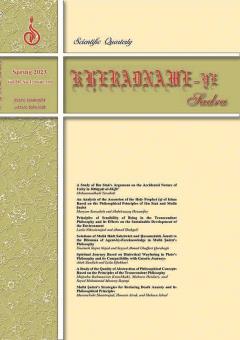Mullā Ṣadrā’s Strategies for Reducing Death Anxiety and its Philosophical Principles
Subject Areas : ملاصدراپژوهی و اندیشۀ حکمت متعالیهManouchehr Shaminezhad 1 * , Hossein Atrak 2 , Mohsen Jahed 3
1 - PhD in Islamic Philosophy and Kalam, University of Zanjan, Zanjan, Iran
2 - Associate Professor, Philosophy Department, University of Zanjan, Zanjan, Iran
3 - Associate Professor, Department of Philosophy and Theology, Shahid Beheshti University, Tehran, Iran
Keywords: Anxiety, death, principiality of existence, trans-substantial motion, supernaturalism, Mullā Ṣadrā,
Abstract :
The present study investigates Mullā Ṣadrā’s strategies for treating death anxiety and its philosophical foundations. It also aims to suggest some philosophical and ontological strategies to decrease modern Man’s anxiety when thinking about death based on some of Mullā Ṣadrā’s philosophical principles, such as the principiality of existence, the union of the intellect with intelligible, the trans-substantial motion, theism, religiosity, and believing in the Hereafter. According to Sadrian philosophy, Man’s life is meaningful and purposeful, and being has been created based on divine emanation. The human soul is corporeally-originated; however, its essence changes because of its union with the intelligible and its own trans-substantial motion and attains higher levels of being though going through different existential grades. This developmental move continues until reaching the origin of being and does not end with death. It also grants meaning to Man’s life and decreases their death anxiety. Mullā Ṣadrā is an existential philosopher who advocates a supernaturalist, theistic, and procedural approach to death. The reality of death in Mullā Ṣadrā’s philosophy is a part of Man’s process of existential development. Some of the strategies that can be inferred from his philosophy to reduce death anxiety include following a teleological approach to the world, being’s view of God as pure connection, believing in the Hereafter and Man’s resurrection after corporeal death, advocating ontological evolution, and having a developmental view of death.
قرآن کریم.
آشتیانی، سیدجلالالدین (1381) شرح بر زاد المسافر، قم: دفتر تبلیغات اسلامی.
ابنسینا (1375) النفس من کتاب الشفاء، تحقیق حسن حسنزاده آملی، قم: مرکز نشر اسلامی.
ابنسینا (1400ق) الشفاء من خوف الموت و معالجة داء الاغتمام به، قم: بیدار.
خواجوی، محمد (1383) ترجمه اسفار اربعه ملاصدرا، تهران: مولی.
سجادی، سیدجعفر (1381) فرهنگ معارف اسلامی، ج1، تهران: دانشگاه تهران.
شیروانی، علی (1387) شرح و ترجمه بدایة الحکمة، قم: بوستان کتاب.
عبودیت، عبدالرسول (1378) هستیشناسی، قم: مؤسسۀ آموزشی و پژوهشی امام خمینی(ره).
متز، تدئوس (1387) «آثار جديد درباره معنای زندگی»، ترجمه محسن جوادی، نقد و نظر، سال هشتم، شماره اول و دوم، ص313ـ267.
مصباح یزدی، محمدتقی (1379) آموزش فلسفه، تهران: سازمان تبلیغات اسلامی.
مصباح یزدی، محمدتقی (1393) شرح جلد 8 اسفار اربعه، قم:
مؤسسۀ آموزشی و پژوهشی امام خمینی(ره).
مصلح، جواد (1391) ترجمه و تفسیر الشواهد الربوبیه، تهران: سروش.
ملاصدرا (1380) الحکمة المتعالیة فى الأسفار الأربعة، ج7، تصحیح و تحقیق مقصود محمدی، تهران: بنیاد حکمت اسلامی صدرا.
ملاصدرا (1381الف) الحکمة المتعالیة فى الأسفار الأربعة، ج6، تصحیح و تحقیق احمد احمدی، تهران: بنیاد حکمت اسلامی صدرا.
ملاصدرا (1381ب) المبدأ و المعاد، تصحیح محمد ذبیحی و جعفر شاهنظری، تهران: بنیاد حکمت اسلامی صدرا.
ملاصدرا (1382الف) الحکمة المتعالیة فى الأسفار الأربعة، ج9، تصحیح و تحقیق رضا اکبریان، تهران: بنیاد حکمت اسلامی صدرا.
ملاصدرا (1382ب) الشواهد الربوبیة فی مناهج السلوکیة، تصحیح و تحقیق سیدمصطفی محقق داماد، تهران: بنیاد حکمت اسلامی صدرا.
ملاصدرا (1383الف) الحکمة المتعالیة فى الأسفار الأربعة، ج3، تصحیح و تحقیق مقصود محمدی، تهران: بنیاد حکمت اسلامی صدرا.
ملاصدرا (1383ب) الحکمة المتعالیة فى الأسفار الأربعة، ج8، تصحیح و تحقیق علی اکبر رشاد، تهران: بنیاد حکمت اسلامی صدرا.
ملاصدرا (1397) الحکمة المتعالیة فى الاسفار العقلیة الاربعة، ج1، تصحیح و تحقیق غلامرضا اعوانی، تهران: بنیاد حکمت اسلامی صدرا.
ملکشاهی، حسن (1376) حرکت و استیفای اقسام آن، تهران: سروش.
ملکیان، مصطفی (1382) درسگفتارهای معنای زندگی، تهران: دانشگاه تربیت مدرس.

